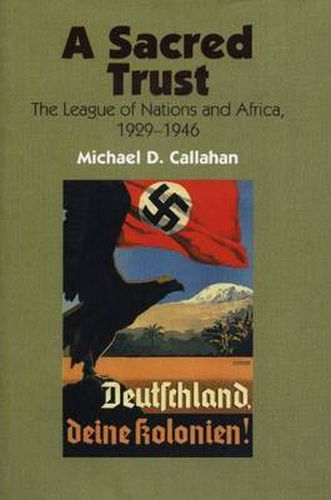Readings Newsletter
Become a Readings Member to make your shopping experience even easier.
Sign in or sign up for free!
You’re not far away from qualifying for FREE standard shipping within Australia
You’ve qualified for FREE standard shipping within Australia
The cart is loading…






The second volume explains how the League of Nations mandates system fused two of the predominant and compelling global forces of the twentieth century: imperialism and Wilsonian internationalism. After the First World War, Britain and France administered most of Germany’s former tropical African colonies as mandates under the supervision of the League as a sacred trust of civilization. This system of international trusteeship changed British and French rule in Africa. In short, mandates were not colonies. Mandates meant less militarism, more commercial equality, a greater emphasis on the interests of Africans, and an end to the extension of European national sovereignty over colonized peoples. Accountability to the League also required the British and French to reconsider traditional economic, strategic, and ideological assumptions about their empires. In the process, the sacred trust sowed the seeds of self-doubt about the very purpose and future of European imperialism. The mandates system continued to represent a genuine internationalisation and reformation of colonialism and had long-term economic, political, and cultural consequences for Africans and Europeans within the mandated territories. Despite the Depression, repeated Anglo-French foreign policy failures, growing humiliations for Geneva, and war in Africa and Europe, the principles and practices of international trusteeship proved persistent. Mandates demonstrated the relevance of international law, the importance of the League of Nations, and the impact of Wilsonian principles on international relations and European imperialism.
$9.00 standard shipping within Australia
FREE standard shipping within Australia for orders over $100.00
Express & International shipping calculated at checkout
The second volume explains how the League of Nations mandates system fused two of the predominant and compelling global forces of the twentieth century: imperialism and Wilsonian internationalism. After the First World War, Britain and France administered most of Germany’s former tropical African colonies as mandates under the supervision of the League as a sacred trust of civilization. This system of international trusteeship changed British and French rule in Africa. In short, mandates were not colonies. Mandates meant less militarism, more commercial equality, a greater emphasis on the interests of Africans, and an end to the extension of European national sovereignty over colonized peoples. Accountability to the League also required the British and French to reconsider traditional economic, strategic, and ideological assumptions about their empires. In the process, the sacred trust sowed the seeds of self-doubt about the very purpose and future of European imperialism. The mandates system continued to represent a genuine internationalisation and reformation of colonialism and had long-term economic, political, and cultural consequences for Africans and Europeans within the mandated territories. Despite the Depression, repeated Anglo-French foreign policy failures, growing humiliations for Geneva, and war in Africa and Europe, the principles and practices of international trusteeship proved persistent. Mandates demonstrated the relevance of international law, the importance of the League of Nations, and the impact of Wilsonian principles on international relations and European imperialism.